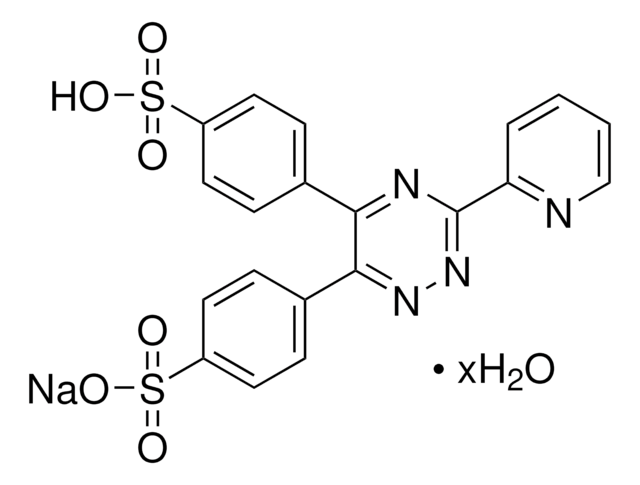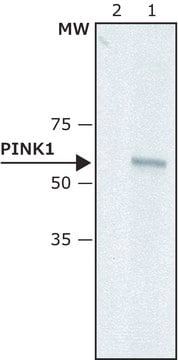P5338
3-(2-Pyridyl)-5,6-diphenyl-1,2,4-triazine-4′,4′′-disulfonic acid sodium salt
Powder
Synonym(s):
5,6-Diphenyl-3-(2-pyridyl)-1,2,4-triazine-4′,4″-disulfonic acid sodium salt, PDT disulfonate
About This Item
Recommended Products
product name
3-(2-Pyridyl)-5,6-diphenyl-1,2,4-triazine-4′,4′′-disulfonic acid sodium salt, BioXtra
product line
BioXtra
Quality Level
form
powder
impurities
≤0.0005% Phosphorus (P)
≤0.1% Insoluble matter
mp
≥300 °C
anion traces
chloride (Cl-): ≤0.1%
cation traces
Al: ≤0.001%
Ca: ≤0.01%
Cu: ≤0.0005%
Fe: ≤0.0005%
K: ≤0.005%
Mg: ≤0.001%
Pb: ≤0.001%
Zn: ≤0.0005%
application(s)
diagnostic assay manufacturing
hematology
histology
storage temp.
room temp
SMILES string
[Na+].OS(=O)(=O)c1ccc(cc1)-c2nnc(nc2-c3ccc(cc3)S([O-])(=O)=O)-c4ccccn4
InChI
1S/C20H14N4O6S2.Na/c25-31(26,27)15-8-4-13(5-9-15)18-19(14-6-10-16(11-7-14)32(28,29)30)23-24-20(22-18)17-3-1-2-12-21-17;/h1-12H,(H,25,26,27)(H,28,29,30);/q;+1/p-1
InChI key
ZGVNYCXXBQPDPQ-UHFFFAOYSA-M
Looking for similar products? Visit Product Comparison Guide
General description
Application
It has also been used in ABTS radical scavenging assay to determine the antioxidant activity of honey samples.
Storage Class Code
11 - Combustible Solids
WGK
WGK 3
Flash Point(F)
Not applicable
Flash Point(C)
Not applicable
Personal Protective Equipment
Choose from one of the most recent versions:
Already Own This Product?
Find documentation for the products that you have recently purchased in the Document Library.
Customers Also Viewed
Our team of scientists has experience in all areas of research including Life Science, Material Science, Chemical Synthesis, Chromatography, Analytical and many others.
Contact Technical Service














